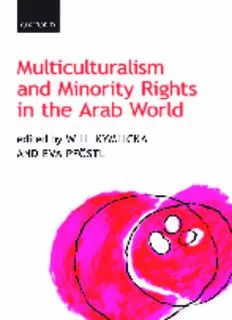Table Of ContentMULTICULTURALISM AND MINORITY RIGHTS
IN THE ARAB WORLD
Multiculturalism and
Minority Rights in
the Arab World
Edited by
WILL KYMLICKA AND
EVA PFÖSTL
1
3
GreatClarendonStreet,Oxford,OX26DP,
UnitedKingdom
OxfordUniversityPressisadepartmentoftheUniversityofOxford.
ItfurtherstheUniversity’sobjectiveofexcellenceinresearch,scholarship,
andeducationbypublishingworldwide.Oxfordisaregisteredtrademarkof
OxfordUniversityPressintheUKandincertainothercountries
#theseveralcontributors2014
Themoralrightsoftheauthorshavebeenasserted
FirstEditionpublishedin2014
Impression:1
Allrightsreserved.Nopartofthispublicationmaybereproduced,storedin
aretrievalsystem,ortransmitted,inanyformorbyanymeans,withoutthe
priorpermissioninwritingofOxfordUniversityPress,orasexpresslypermitted
bylaw,bylicenceorundertermsagreedwiththeappropriatereprographics
rightsorganization.Enquiriesconcerningreproductionoutsidethescopeofthe
aboveshouldbesenttotheRightsDepartment,OxfordUniversityPress,atthe
addressabove
Youmustnotcirculatethisworkinanyotherform
andyoumustimposethissameconditiononanyacquirer
PublishedintheUnitedStatesofAmericabyOxfordUniversityPress
198MadisonAvenue,NewYork,NY10016,UnitedStatesofAmerica
BritishLibraryCataloguinginPublicationData
Dataavailable
LibraryofCongressControlNumber:2013951378
ISBN 978–0–19–967513–5
PrintedinGreatBritainby
CPIGroup(UK)Ltd,Croydon,CR04YY
LinkstothirdpartywebsitesareprovidedbyOxfordingoodfaithand
forinformationonly.Oxforddisclaimsanyresponsibilityforthematerials
containedinanythirdpartywebsitereferencedinthiswork.
Acknowledgments
Mostofthechaptersinthisvolumewereinitiallypresentedataworkshopheld
inRomeon25–6March2011.WewouldliketothankQueen’sUniversityin
Kingston,Canada,theIstitutodiStudiPoliticiS.PioV,Rome,andtheLibera
Universita Internazionale degli Studi Sociali, Guido Carli, LUISS, Rome, for
theirfinancialsupportandlogisticalassistanceofthatworkshop.Thanksalso
toFahimaCharafeddine,HassanHanafi,PaolaPizzo,andGiuseppeScattolin
fortheirhelpfulcontributionstotheworkshop.Wehavecommissionedafew
additional chapters to broaden the focus of the volume. The chapters have
been extensively revised and we are grateful to all the authors for their
enthusiasm for the project. We would also like to thank Kyle Johannsen for
helpcompilingthemanuscript,DominicByattatOxfordUniversityPressfor
his support, and Benno Simma for designing the wonderful cover image on
ourbehalf.
Contents
NotesonContributors ix
1. Introduction 1
WillKymlickaandEvaPföstl
PARTI: THEORETICALANDHISTORICALPERSPECTIVES
2. TheMinorityQuestion:AViewfromHistoryand
theKurdishPeriphery 27
JanetKlein
3. TransformationsintheMiddleEast:TheImportance
oftheMinorityQuestion 53
JoshuaCastellinoandKathleenCavanaugh
4. MinoritiesintheArabWorld:Faults,Fault-lines,andCoexistence 74
ZaidEyadat
5. ArabMinorities,Liberalism,andMulticulturalism 100
FrancescaMariaCorraoandSebastianoMaffettone
PARTII: CASESTUDIES
6. BringingtheTribeBackIn?TheWesternSaharaDispute,
Ethno-history,andtheImagineeringofMinorityConflicts
intheArabWorld 127
JacobMundy
7. TheRoleoftheAmazighMovementintheProcesses
ofPoliticalReforminPostcolonialAlgerianSociety 151
EvaPföstl
8. TheGulf’sServantClass 174
NicholasMcGeehan
9. HobbesianCitizenship:HowthePalestiniansBecame
aMinorityinIsrael 189
HassanJabareen
viii Contents
10. TheFederalizationofIraqandtheBreak-upofSudan 219
BrendanO’Leary
11. HowDoestheArabWorldPerceiveMulticulturalism
andTreatItsMinorities?TheAssyro-ChaldeansofIraq
asaCaseStudy 250
JosephYacoub
Index 279
Notes on Contributors
Joshua Castellino is Professor of Law and Head of the Law Department,
Middlesex University, UK. His books include: Minority Rights in the Pacific
(Oxford:OxfordUniversityPress,2009,withDavidKeane);MinorityRightsin
Asia(Oxford:OxfordUniversityPress,2006,withElviraDomínguezRedondo);
TheEndoftheLiberalStateandtheFirstTerrorist(Hendon:MiddlesexUniver-
sityPress,2009);InternationalLaw&IndigenousPeoples(ed.)(Alphenaanden
Rijn:Kluwer,2004);TitletoTerritoryinInternationalLaw:ATemporalAnalysis
(Aldershot: Ashgate, 2003 with S. Allen); and International Law & Self Deter-
mination(Dordrecht:MartinusNijhoff,2000).HismostrecentbookisMinority
RightsintheMiddleEastwithKathleenCavanaugh(OUP,2013).
KathleenCavanaughisLecturerofInternationalLawintheFacultyofLaw,Irish
Centre forHumanRights,NationalUniversityofIreland,Galway.She holdsa
LLMfromtheQueen’sUniversityofBelfastandaPh.D.inComparativePolitics
fromtheLondonSchoolofEconomicsandPoliticalScience.Herresearchfocuses
onthestudyofnationalism,ethnicconflict,politicalviolence,applicablehuman
rightslawsinentrenchedstatesofemergency,andthelawsofbelligerentoccu-
pation.HercurrentprojectsincludeMinorityRightsintheMiddleEast(Oxford:
OxfordUniversityPress),withco-authorJoshuaCastellino,aswellasamono-
graphentitledMilitantDemocracywhichinvestigatestheexclusionradicalization
thesis,focusingontheMuslimcommunityintheUK.Asaconsultant,shehas
undertakennumerousmissionsonbehalfofAmnestyInternationalincludingto
NorthernIreland,Israel/Palestine,and,morerecently,toIraq.
Francesca Maria Corrao is Professor of Arabic Language and Literature at
LUISS University, Rome. Among her books: Adonis: Nella pietra e nel vento
(Messina:Mesogea,1999);AntologiadellaPoesiaAraba(Rome:Labiblioteca
direpubblica,2004);L’esteticanellapoesiadelMediterraneo(ed.)(Mazaradel
Vallo: Atti del convegno, 2006); Les Histoires de Giufà (Lyons: La fosse aux
ours, 2005); In un mondo senza cielo (Florence: Giunti, 2007); Bennis: Il
Mediterraneoelaparola(ed.)(Rome:Donzelli,2009).
Zaid Eyadat isAssociate Professor of PoliticalScience andInternationalRela-
tions at the University of Jordan, where he serves as Chairman of the Human
Rights and Human Development Department. His publications include: “Cul-
tureandForeignPolicy:AnExplanatoryModel.AmericanForeignPolicyPost
9/11”and“TheCalculusofConsensus:AnAlternativePathtoArabDemocracy.”
Hassan Jabareen is the Founder of Adalah—The Legal Center for Arab
Minority Rights in Israel. He has extensive experience in litigating landmark
Description:Since the Arab Spring, Arab states have become the new front line in the struggle for democratization and for open societies. As the experience of other regions has shown, one of the most significant challenges facing democratization relates to minority rights. This book explores how minority claims

